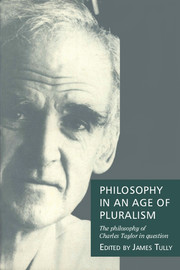Book contents
- Frontmatter
- Contents
- Notes on the contributors
- Preface
- Acknowledgements
- Introduction
- Part I Foundations
- 1 Internal and external in the work of Descartes
- 2 Taylor on truth
- Part II Interpreting modernity
- Part III Natural and human sciences
- Part IV Philosophy in practice
- Part V Ethics, politics and pluralism
- Part VI Reply and re-articulation
- Bibliography of the works of Charles Taylor
- Index
2 - Taylor on truth
Published online by Cambridge University Press: 05 June 2012
- Frontmatter
- Contents
- Notes on the contributors
- Preface
- Acknowledgements
- Introduction
- Part I Foundations
- 1 Internal and external in the work of Descartes
- 2 Taylor on truth
- Part II Interpreting modernity
- Part III Natural and human sciences
- Part IV Philosophy in practice
- Part V Ethics, politics and pluralism
- Part VI Reply and re-articulation
- Bibliography of the works of Charles Taylor
- Index
Summary
My deepest, most heartfelt, disagreements with Charles Taylor are too complicated to discuss within the word limit to which the editors have, sensibly, restricted contributors to this volume. Perhaps our most basic disagreement is whether poetry should be seen as ‘a means of arranging the order of our internal lives by making an harmonious pattern of extremely complex attitudes, once thought to refer to an external order of metaphysics but now seen to be a symbolic ordering of our inner selves’. Taylor says that ‘such a self-enclosed reading manifestly will not do’ for such writers as ‘Eliot, Pound, Mann, Lawrence, Joyce, Proust or Rilke’. I think that it will do admirably. Indeed, I think that one of the most important changes for the better in recent centuries is our increasing willingness to see our poets as edifying examples of how to be mere human self-fashioners, rather than as people who open us up to something other than themselves, and perhaps other than human.
If Taylor and I tried to argue about whether one should encourage a tendency to envisage hypergoods, rather than simply arranging and balancing ordinary goods, we should probably end up talking about the details of our favourite poems and novels. For I suspect that different literary canons, and disagreement about how to read the works which appear in both our canons, lie at the bottom of our disagreement about the nature of moral experience.
- Type
- Chapter
- Information
- Philosophy in an Age of PluralismThe Philosophy of Charles Taylor in Question, pp. 20 - 34Publisher: Cambridge University PressPrint publication year: 1994
- 6
- Cited by



